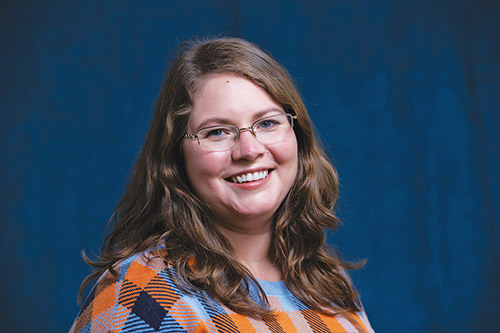
YU Professor Dr. Elizabeth Seng, lead author in the pilot, receives 2022 award from the American Neurological Association.
(Courtesy of YU) Mindfulness-based therapy consisting of meditation training and mindfulness exercises can provide significant relief for people suffering from migraine disease, according to a recent clinical trial conducted by Dr. Elizabeth Seng, associate professor of psychology at Yeshiva University’s Ferkauf Graduate School of Psychology. For her work on the study, Dr. Seng was honored by the American Neurological Association with a 2022 Poster Award; winners are chosen by the leaders in the field of neurology for excellence in the field.
During the Phase 2b pilot randomized clinical trial, participants who received an eight-week course of individual Mindfulness-Based Cognitive Therapy for Migraine (MBCT-M), versus those who received “treatment as usual,” experienced a significant reduction in symptoms and frequency of attacks. The six-month follow-up showed that participants continued to experience large reductions in headache disability.
This award-winning research is just one of many successes being generated at Yeshiva University. Graduate school enrollment has increased by over 60% since 2016, with Dr. Seng’s work being an exemplar of the important research being conducted in YU’s graduate schools. YU has raised over $350 million since launching Rise Up: The Campaign for 613, including $100 million this year alone. And YU is the No. 3 university in all of New York City, according to U.S. News & World Report.
Migraine is a common neurologic disease estimated to affect over a billion people worldwide. Disproportionately affecting women ages 15-49 years of age, migraine is characterized by unpredictable episodic attacks of potentially debilitating neurological symptoms.
The use of mindfulness-based treatments “can change the way patients respond to pain by making it more tolerable and by making it easier to engage in meaningful activities despite symptoms, alleviating headache-related disability,” explained Dr. Seng. “This study shows that mindfulness-based techniques are a promising emerging treatment for reducing migraine-related pain and helping migraine sufferers.”
MBCT can be used in conjunction with other behavioral treatments for migraine, including cognitive-behavioral therapies, relaxation and biofeedback, which have demonstrated efficacy to reduce stress—commonly thought to trigger migraine attacks—and migraine attack frequency.
“This cutting-edge study using MBCT on migraine showed a marked reduction in pain and frequency in monthly symptoms, which continued long after the trial ended,” noted Dr. Leslie F. Halpern, dean of the Ferkauf Graduate School of Psychology at Yeshiva University. “This is a promising emerging treatment for addressing migraine-related disability and bringing relief to migraine sufferers—a perfect example of the kind of research Ferkauf supports and encourages, enhancing the quality of day-to-day life for real people.”
For more information regarding the Ferkauf School of Psychology, visit www.yu.edu/ferkauf.










